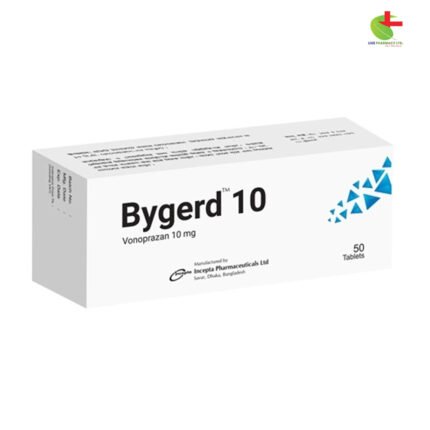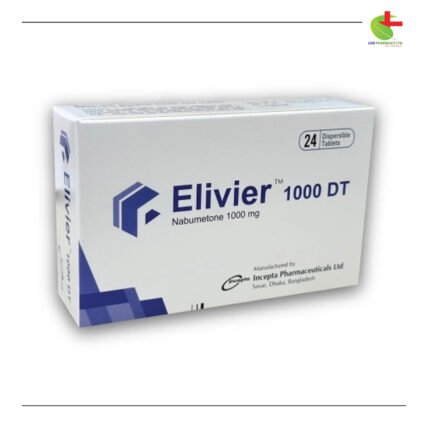Elivier 500
150.00৳ Strip
- Elivier (Nabumetone) is an NSAID used for relief of symptoms of osteoarthritis and rheumatoid arthritis.
- Inhibits prostaglandin synthesis to reduce pain, inflammation, and fever.
- Available in 500 mg, 750 mg, and 1000 mg tablets.
- Typically taken once daily, with dosage adjusted based on individual needs.
- Use under the guidance of a healthcare professional.
 Brand
Brand
|
Incepta Pharmaceuticals Ltd |
|---|---|
 Generics
Generics
|
Nabumetone |
 Type
Type
|
Tablet |
Indications
Elivier is indicated for the relief of symptoms associated with osteoarthritis and rheumatoid arthritis. It should be used at the lowest effective dose for the shortest duration necessary, in line with individual treatment goals. Prior to use, the potential benefits and risks of Elivier and other treatment alternatives should be carefully considered.
Always use Elivier as prescribed by a healthcare professional.
Pharmacology
Nabumetone, the active ingredient in Elivier, is a non-steroidal anti-inflammatory drug (NSAID) with analgesic, anti-inflammatory, and antipyretic properties. Nabumetone works by inhibiting prostaglandin synthesis, which plays a key role in the anti-inflammatory effects. As a prodrug, Nabumetone is metabolized in the liver to 6-methoxy-2-naphthylacetic acid (6MNA), the active compound that inhibits prostaglandin synthesis effectively.
Dosage & Administration
- 500 mg & 750 mg Tablets: Take orally.
- 1000 mg Tablets: Dissolve 1 tablet in 250 ml of water and consume immediately.
For osteoarthritis and rheumatoid arthritis, the starting dose is 1000 mg once daily. Depending on individual response, the dose may be increased to 1500 mg to 2000 mg daily, taken either once or twice daily. Doses exceeding 2000 mg have not been studied.
For patients with moderate to severe renal insufficiency, the initial dose should not exceed 750 mg (moderate renal insufficiency) or 500 mg (severe renal insufficiency). Doses can be cautiously increased based on renal function monitoring.
Safety and effectiveness in pediatric patients have not been established.
Drug Interactions
NSAIDs like Elivier may reduce the effectiveness of ACE inhibitors used for blood pressure control. This interaction should be monitored in patients using both treatments simultaneously.
Contraindications
Elivier is contraindicated in patients with a known hypersensitivity to nabumetone or its ingredients. It should also not be used in individuals who have experienced asthma, urticaria, or allergic-type reactions to aspirin or other NSAIDs. It is also contraindicated in peri-operative pain following coronary artery bypass graft (CABG) surgery.
Side Effects
Common side effects of Elivier may include:
- Gastrointestinal: Diarrhea, nausea, constipation, abdominal pain, flatulence.
- Central Nervous System: Dizziness, headache, fatigue, insomnia.
- Dermatologic: Rash, itching.
- Miscellaneous: Tinnitus, edema.
Pregnancy & Lactation
Pregnancy: Elivier should only be used during pregnancy when the potential benefit outweighs the risks, especially in the third trimester, due to the potential risk to the fetal cardiovascular system.
Lactation: Elivier is not recommended during breastfeeding due to possible adverse effects on the neonate. If necessary, consider discontinuing breastfeeding.
Precautions & Warnings
- Renal toxicity: NSAIDs like Elivier may impair kidney function, especially in patients with compromised renal function, heart failure, or liver dysfunction. Long-term use requires careful monitoring.
- Elderly patients: Use with caution as they are at increased risk of adverse reactions.
Overdose Effects
Overdose symptoms of Elivier may include nausea, vomiting, epigastric pain, and lethargy. In severe cases, gastrointestinal bleeding, renal failure, or respiratory depression may occur. Treatment is symptomatic and supportive. Activated charcoal and gastric lavage may be used within 4 hours of ingestion in large overdoses.
Therapeutic Class
Elivier belongs to the class of drugs for osteoarthritis and drugs used in rheumatoid arthritis treatment.
Storage Conditions
Store Elivier in a cool, dry place away from moisture and light. Keep all medications out of reach of children.













Reviews
There are no reviews yet.